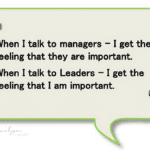It might be an old saying but I find the words valuable. One of the most frustrating things I deal with is people who promise things on a certain date or time – with specific information – and it just doesn’t happen. They miss the deadline or forget the information. Or both.
Let’s look at an example – the hard drive on my computer died not too long ago. I was doing data back-ups like a good girl, but they weren’t scheduled daily. And when the CPU crashed, I had some work that had not yet been backed up. My computer guy was honest with me. He didn’t know whether or not he could recover all my files. He said he would try. I couldn’t really ask for more since I wasn’t backing up the data daily.
Couple days later, he called and said it wasn’t looking good and I should not get my hopes up. A few days after that, I got the call that he had recovered everything. I was thrilled!
This is a classic example of under promise (i.e. “don’t get your hopes up”) and over deliver (aka “recovered everything”). If he had said, no worries…I can get the data restored and he didn’t, then I would have been incredibly disappointed. Because he got my hopes up. And, it might have effected whether or not I believe his claims in the future.
Another example we’re all familiar with is the proverbial “sandbagging” the budget. I have on many occasions understated revenue in the budget and overstated expenses. Why? Because it’s easier to tell people the team made more or spent less than what was expected. The expectation is to meet the budget. If you don’t, there might come a moment when you have to explain to folks that you didn’t meet the revenue goal or properly manage expenses.
Some folks might call sandbagging the budget a game, but the reality is it happens. A lot. Because none of us like saying negative things like “Jane didn’t sell enough.” or “Bob spent too much on food at the meeting.”
On the other hand, this doesn’t mean that everything always turns out perfectly. We all have moments where something in our lives goes kablooey and we can’t meet a deadline. Or we’re thrown a curve ball and need to get additional information before sending in our report. But when we make a commitment to do something, the expectation is we will deliver. And if we can’t, then the proper thing to do is let someone know. Communicate and renegotiate the deliverable.
Your customers will be delighted when you set realistic expectations, communicate regularly and create opportunities to exceed your promises. Besides, it will make your life a whole lot easier.
P.S. While this post is about exceeding expectations, I learned a valuable lesson about the importance of backing up computer data regularly. Listen to me. Do it. You don’t want to recreate all of the stuff you have on your computer. Facing the prospect of having to possibly recreate even a few days worth of work convinced me.
0







Julie J says
I don’t really think about this in my every day work. I offer what I think I can do and hope/expect to live up to it. I see what you’re saying about providing the surprise ending for your client, but when you’re trying to win them over how do you focus on not wanting to offer the best?
Ginger says
I totally agree with you, Sharlyn! It’s just a matter of being honest. Like you said – not delivering WILL affect someone’s future opinion. I would rather hear the hard truth once than constantly be reminded I can’t rely on someone (next Tuesday, definitely! …uhm…Thursday …definitely by Monday…).
Benjamin McCall says
Always so important to follow through with what you say and set realtic goals, deadlines and expectations. So many people this you only do this in business but it also need to hold the same water in personal life as well!
@BenjaminMcCall
Sharlyn Lauby says
@Julie – Thanks for the comment. I’m not sure what we’re saying is mutually exclusive. I agree with you in offering what you can deliver. If you can offer your best and deliver it every time, then great! But, you’re in the minority in doing that. And, it’s always great when you can include a wow. What becomes difficult is when people are quick to say ‘yes, I can do that’ when they should say ‘hmm…let me see what I can do.’ My thought is it’s better to say the latter and deliver the wow than the former and end up disappointing someone.
@Ginger – Absolutely, being upfront and honest is key. It all seems to come back to matters of trust and transparency. Thanks for the comment!
@Benjamin – Good point…this applies to personal lives as well. Thanks for adding to the conversation.
John Hunter says
I agree with this tactic. The trick is that the goal is not to under-promise so you can just be lazy. The idea is to stop the all too common wishful thinking promise that you then fail to meet. Just promise what you are certain you can do and then try to surpass what you have said. Under-promising by too much is not useful.
Sharlyn Lauby says
Well said John. The goal isn’t to get away with doing less. It’s to set proper expectations. Thanks for the comment!
sam says
Totally agree about deliver the promise. For engineering projects, there are so much interdependence between the completion of prior phase and the start of next phase. Too much Sandbags could make the project un-achievable and lower the project support. What should be the right balance?
Sharlyn Lauby says
Thanks for commenting Sam. I agree it’s a fine line. You want to build in for contingencies but not to the point where you negatively impact the outcomes. This is where it’s important to understand your business model and pricing structure.